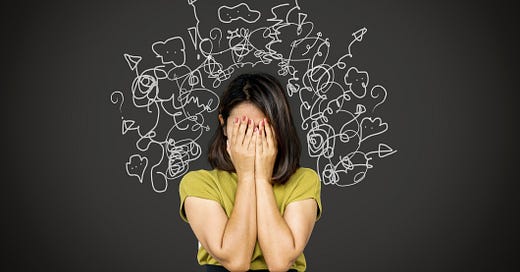“There were many terrible things in my life and most of them never happened.” — Michael Montaigne
“Everything is ruined:” Catastrophizing is the tendency to jump to negative conclusions and assume a bad outcome.
My patient, Juliet, was a hard-wired catastrophizer. Whenever she encountered an ambiguous or challenging situation, she assumed the worst. If an old friend didn’t wave hello across a crowded room, she assumed the person no longer liked her. If her mother didn’t return her call within 20 minutes, she worried about a medical emergency. If her boss scheduled a meeting with her, she was convinced she was being fired. When her dog wandered into the neighbor’s yard and didn’t immediately come when she called, she worried he had been hit by a car.
Here is why it’s bad for you: Negative Spiraling
When we catastrophize, we fixate on the worst possible outcome and treat it as likely, even when it is not. Overestimating the probability of a negative situation fuels irrational worry and turns a minor setback into a definitive dead-end. The result is hopelessness, frustration, and avoidance. The ultimate result of catastrophizing is missing out on opportunities and experiences that bring us joy and meaning.
Here is what you can do about it: Find Middle Ground
To counteract this doomsday mindset, Martin Seligman, the founder of Positive Psychology, suggests a simple exercise called “Put it in Perspective.” As soon as negative spiraling kicks in:
Step 1: Play out the worst-case scenario
Step 2: Play out the best-case scenario
Step 3: Consider what’s most likely to happen
Between the two extremes, you’re more likely to find the most realistic outcome.
As this exercise helps us understand, it is not the incident itself but the negative interpretation of the incident that leads to catastrophic thinking and the subsequent snowballing of negative emotions. The key is to un-twist these cognitive distortions and recognize that the mountain we face may in fact be a molehill or at least more of a Mount Pleasant than Mount Everest.






I am in my 60's and as long as I can remember, I always think the worst. I don't know where it came from. My parents were not like that. I hate to say it but I've come to think: "Expect the worst and you'll never be disappointed." Thanks for the tip on doing away with this!
I sometimes catastrophize situations, especially when they potentially require spending money or a lot of time to resolve. It is not always bad. I think the worst case scenario and then back off from it towards the most likely reality. I call it going out as far as I can and coming back. Once I've done that - I can live with whatever happens.